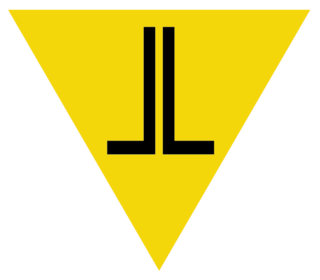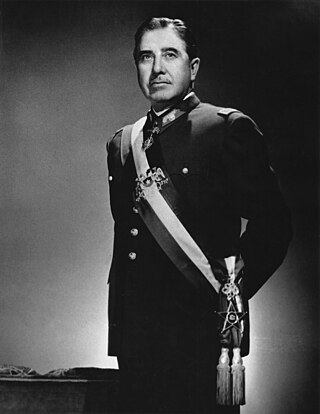
Elections in Chile are held nationwide, including the presidency, parliament, regional offices, and municipal positions. Chilean citizens and foreign residents with legal residency of at least five years, who are 18 years or older on election day, are eligible to vote. Previously, voting was voluntary, but since 2023, it has become compulsory.

National Renewal is a liberal conservative political party in Chile. It is a member of Chile Vamos, a centre-right to right-wing coalition. Sebastián Piñera, the former President of Chile, was a member of the party.
The Regionalist Party of Cantabria is the second oldest political party in the Spanish Autonomous Community of Cantabria. The PRC originated in the Association in Defense of the Interests of Cantabria (ADIC), founded on 14 May 1976, with the objective of promoting Cantabrian autonomy.
The Agrarian Party was a political party in Chile, formed in 1931 and dissolved in 1945 to merge with the Popular Freedom Alliance as the Agrarian Labor Party.

The MAS Region, known until 2014 as Broad Social Movement was a Chilean left-wing political party founded by Alejandro Navarro in 2008.

The Independent Regionalist Party was a centrist political party in Chile. The party was regionalist ideologically but had a nationwide presence. It was intended to be an alternative to the dominant coalitions in the Chilean electoral system, the New Majority and the Alliance.

The Party of the South was a Chilean regionalist political party. It existed between 1987 and 1998.

Chile Vamos is a centre-right to right-wing political coalition of three political parties in Chile. The coalition was created on 29 January 2015 by the general secretaries of the Independent Democrat Union (UDI), National Renewal (RN), Democratic Independent Regionalist Party (PRI) and Political Evolution (Evópoli).

The Liberal Party was a Chilean centrist political party existing between 1988 and 1994.

Green North Regional Force was a Chilean regionalist political party active only in the Coquimbo Region. It was legally constituted by the Electoral Service of Chile from 2015 until 2017, when it merged into the Social Green Regionalist Federation.

The Broad Front was a Chilean political coalition founded in early 2017, composed of left-wing parties and movements. Its first electoral contest was the 2017 Chilean general election, where their presidential candidate Beatriz Sánchez came third with 20% of the vote in the first round of election. The Broad Front also expanded their electoral representation to 20 deputies, 1 senator and 21 out of 278 Regional Councillors, thus consolidating the movement as the 'third force' in Chilean politics.
The Social Green Regionalist Federation is a Chilean political party.

Pinochetism is an authoritarian and personalistic political ideology rooted in the military dictatorship led in Chile between 1973 and 1990 by Augusto Pinochet. Ranging from the right-wing to the far-right, Pinochetism is characterised by its anti-communism, conservatism, militarism, and nationalism. Under Pinochet, Chile's economy was placed under the control of a group of Chilean economists known collectively as the Chicago Boys, whose policies have been described by some as neoliberal. Former and current supporters of the dictatorship are known as pinochetistas.
Women's suffrage in Chile was introduced on the communal level in 1935, and on national level on 8 January 1949. It was the product of a long period of activism, tracing back to 1877, when women were allowed to attend university, a reform which stimulated the formation of a women's movement. The women's suffrage was a reform which was actively promoted since the 1920s by the organizations Consejo Nacional de Mujeres de Chile Comité Nacional pro Derechos de la Mujer, Pro-Emancipation Movement of Chilean Women and Federación Chilena de Instituciones Femeninas (FECHIF).

Apruebo Dignidad was a democratic socialist Chilean electoral coalition officially created on 11 January 2021, by the Broad Front and Chile Digno in preparation for the Constitutional Convention election.

Chilean nationalism is the nationalism of Chilean people and Chilean culture. It began as a strain of political thought that originated between 1904 and 1914 with the rise of the centenary essayists, the birth of the Nationalist Party and the reactivation of the authoritarian political discourse of the statesman Diego Portales.

Ibañismo is a personalist, populist political movement developed around the figure of General Carlos Ibáñez del Campo, who governed Chile over two periods. Although their location within the political spectrum is unclear, given that there were parties and movements of both the right and the left that defined themselves as Ibañistas, common characteristics can be observed that allow them to be grouped within a similar ideology: statism, populism, militarism, authoritarianism, historical socialism, nationalism, presidentialism, proto-fascism, and others.
We are Aysén was a Chilean regionalist political party, founded on October 23, 2015. Its main objective is to represent the interests of the inhabitants of the Aysén Region. It was officially recognized by the Electoral Service of Chile between 2016 and 2017, when SA was merged into the Social Green Regionalist Federation.

The Regional and Popular Front was a Chilean centre-left political party with a regionalist ideology. It was active only in the regions of Antofagasta and Atacama. On June 20, 2016, the legal constitution of the party was recognized in the aforementioned regions and in April 2017 it merged with other several regionalist parties into the Social Green Regionalist Federation (FREVS).














